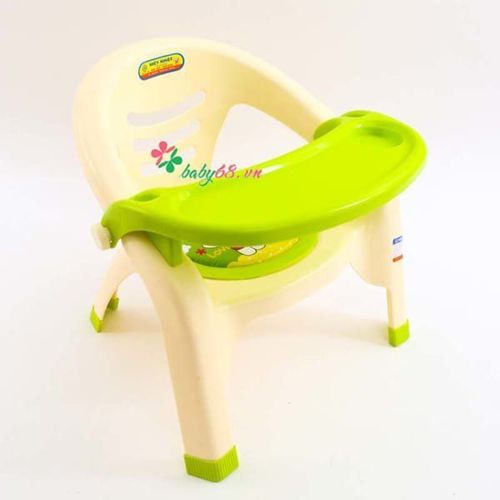This is an automatically translated article.
Entering the 6th month after birth, the amount of breast milk begins to dilute and gradually decrease, unable to provide enough essential nutrients for the baby's development. This is also the time when mothers should give their children solid foods to supplement other nutritional sources besides breast milk.1. The right time for baby to eat solids
Weaning is a method for children to start learning to eat foods other than breast milk, helping to supplement essential nutritional sources for the child's comprehensive development needs.According to recommendations from the World Health Organization, the time when mothers should start introducing solid foods to their babies is around 6 months of age or older. At that time, the digestive system and the filtering function of the kidneys in the child had developed stronger and more complete than the previous stage, enough for the child to be able to absorb nutrients from other foods. breast milk source.
In general, the amount of breast milk will start to thin and become less when the baby is about 6 months old. Meanwhile, children need more nutrients to develop comprehensively, so breast milk cannot meet the baby's needs at this time. According to researchers, breast milk will only meet more than half of the daily nutritional needs of children aged 6-12 months. To be able to develop healthy both physically and mentally, you should introduce solid foods to your child at this time.
However, parents should not introduce children to solid foods too early, especially for children under 5 months old. Introducing solids at this time can cause some problems for your baby's health, such as digestive upset or diarrhea. This is partly because a baby's digestive system is still immature and immature to handle solid foods. On the contrary, parents also note that we should not introduce solid foods to children too late for the recommended age, such as 8-9 months old. The late introduction of solid foods will cause the baby's body to be deprived of essential nutrients, at high risk of leading to underweight, growth retardation, or growth retardation.

Các bậc phụ huynh không nên cho trẻ tập ăn thức ăn đặc từ quá sớm, đặc biệt là đối với trẻ dưới 5 tháng tuổi
2. Pay attention to the baby's signs of wanting to eat solids
You can rely on some of the following signs to determine the right time for your baby to start solids, including:Baby can sit up on his own and know how to lean back in a chair Knows how to keep his head straight and turn his head parties flexibly Becomes interested in foods other than breast milk when they see people eating their limbs are flexible, can grasp objects and put them in their mouths After breastfeeding, the baby still feels hungry.
3. Prepare baby food
The equipment used to introduce solids will depend on each mother's feeding method. According to recommendations from nutrition experts, before giving babies weaning food, mothers should prepare the following tools to make feeding easier:High chair for babies to eat solids Pot specializing in cooking powder for children Bowls, plates, cups, spoons (preferably non-breakable ones) Food dividers Baby bibs, or wet wipes to wipe the child's mouth.

Bạn nên cho bé ngồi cố định trên ghế ăn dặm khi bắt đầu cho bé ăn
4. Give your baby proper weaning
In the first few days of introducing solids, let your baby get used to the food first. Mothers also need to be well equipped with the necessary knowledge about weaning for their babies so that they can take the steps safely and effectively.First of all, you need to keep in mind that solids are just a snack and your baby still needs to be breastfed regularly until 12 months of age. The first days you can feed your baby 2 powdered meals/day, and breastfeed at least 3-4 times/day; then the frequency of feeding the baby powder can be gradually increased to 3-4 times/day when the child is nearly 12 months old.
For the first weaning meals, give your baby foods that are as sweet as breast milk first so that he doesn't feel too strange. Later in the day, you can slowly switch to foods that are a bit saltier, with more nutrients.
Besides, the amount of solid food for children also needs to be reasonable, avoiding too much or too little. First, give your child a moderate amount of food, then increase it gradually as the child gets used to it. This helps children's digestive system not suddenly have to work too hard, helping them gradually adapt to the foods being consumed.
In addition, when giving solid foods to babies, mothers need to closely monitor them to avoid choking on food, leading to choking. Let your child freely hold the food bowl or touch the food if he wants to. Another rule when introducing solid foods to babies is to absolutely not force them to eat a lot, be patient and try again the next time they are more interested.

Khi cho bé ăn dặm, mẹ cần theo dõi chặt chẽ để tránh trường hợp trẻ bị nghẹn thức ăn, dẫn đến nghẹt thở
5. Choose foods for babies to eat weaning
When feeding babies with solid foods, mothers need to ensure that they provide their children with the following 4 groups of substances:5.1 Carbohydrates Mothers can choose plain rice, or mashed potatoes, porridge and oatmeal for babies to eat. When the child is more than 1 year old, the mother can add other foods such as ground beef, potatoes, or pho to help the baby more interested in the dish.
5.2 Protein Mothers should also provide adequate protein for their children from foods such as fish, meat (animal sources) or foods (vegetable sources).
5.3 Vitamins, minerals and fiber These substances are very important for the digestive system of children, helping the body to prevent intestinal problems. You can supplement your children with these groups of substances through fresh fruits such as papaya, oranges, or mangoes.
5.4 Fats Some plants are rich in fats like sesame, soybeans; or animals like lard or chicken. Mothers should flexibly use these types of fats in the preparation of food for their children to ensure adequate nutrition for their children.
For children to be healthy and develop well, it is necessary to have a nutritious diet in terms of quantity and quality balance. If children are not provided with adequate and balanced nutrients, it will lead to diseases of excess or lack of nutrients, which adversely affect the comprehensive development of children in terms of physical, mental and motor skills.
The period of baby eating solid foods is an extremely important period to help children develop comprehensively. Children who do not eat properly are at risk of micro-mineral deficiencies, causing anorexia, growth retardation, malabsorption, etc. If they notice the above signs, parents should supplement their children with supportive products. The supplement contains lysine, essential micro-minerals and vitamins such as zinc, chromium, selenium, and B vitamins to help fully meet the nutritional needs of children. At the same time, these essential vitamins also support digestion, enhance nutrient absorption, help improve anorexia, and help children eat well.
Parents can learn more:
Signs of zinc deficiency in children
Micronutrient deficiency and failure to gain weight in children
Please regularly visit Vinmec.com website and update useful information to take care of your child. Take care of the baby and the whole family.
Reference source: babycenter.com













